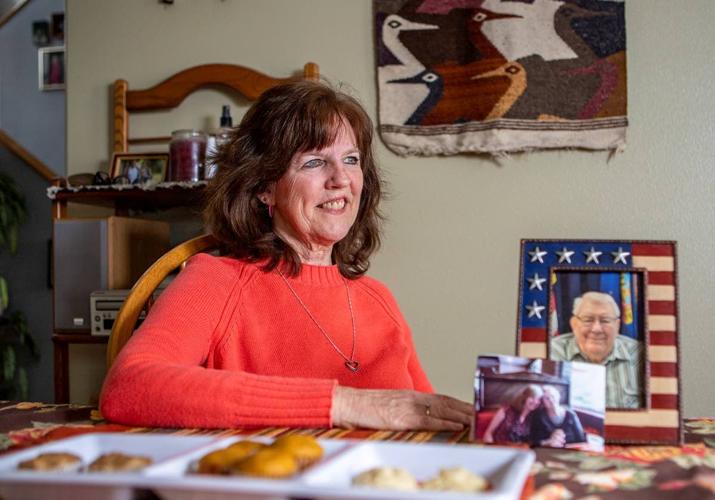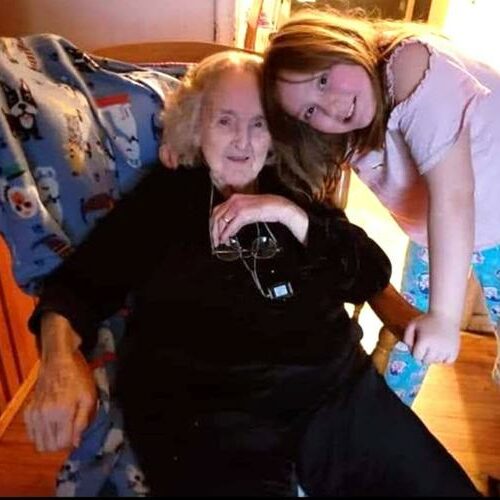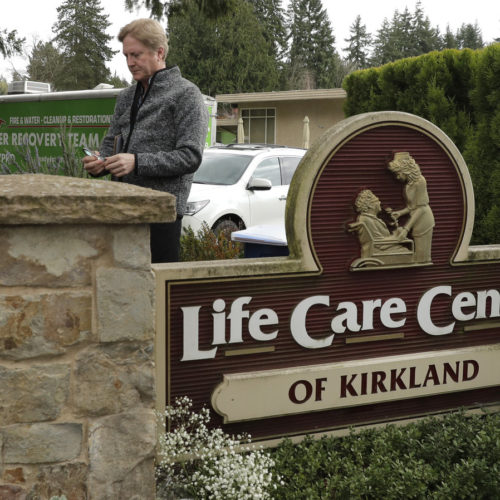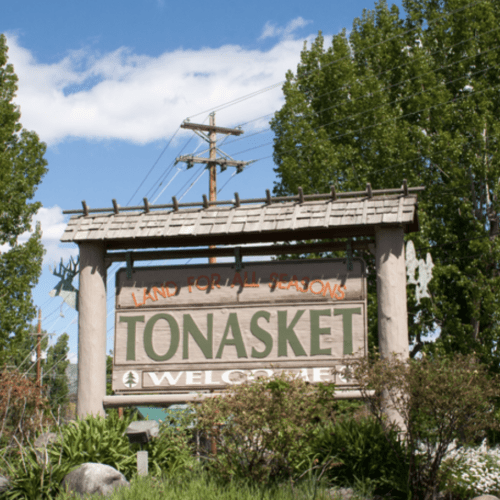
Grieving During The Pandemic – Part One
Listen
Read
During the pandemic, many people who lost loved ones had limited access to say their final goodbyes due to health restrictions at hospitals and assisted living facilities. Now, some of those families are sharing their stories. NWPB’s Rachel Sun talked to some of them.
Nan Orton’s family has always been close. They never had a party without her parents, Jeanne and Jerome Schrempp. When the two went to separate nursing homes a few years ago because of their medical needs, the family brought the party to them.
Before COVID-19, all four of the Schrempp’s daughters would visit their parents often. After restrictions were put in place, they worked to find ways to stay connected. That was especially hard with Orton’s mother, Jeanne, because of her dementia.
“We actually stood out in a kind of carport at Mom’s transitional care. We would be on the other side of this window and Mom would be inside in your wheelchair, you know, we’d be trying to talk through glass. They didn’t really have anything in place. I don’t think they had time. Nobody could see it coming,” Nan Orton said.
Throughout the pandemic, the family was able to have a few, limited visits with Jerome and Jeanne. In December 2020, Jeanne died.
For Orton, the hardest part about her parents’ death was not being able to be with her mother in the end. Just hours after the family learned about her declining state, she was gone.
“She was alone. And I just think, ‘Oh Mom, I wish you would have had the break that Dad had, because we were all there. As soon as I walked in, I rushed over to him. And I said, ‘Dad, you were a good dad.’ I wish I could have said that kind of thing to Mom.”
After Jeanne’s death, the family stayed connected with Jerome over the phone and dropping off care packages. In September of last year, Jerome’s health began to decline. Soon after, he was moved to a room in his nursing home for end-of-life care.
Although they were required to wear full personal protective equipment, family members, along with a few friends, were able to visit him. Grandchildren too far to drive said goodbye over video calls and played some of Jerome’s favorite music from the Grand Ole Opry — songs from Willie Nelson and Charley Pride, whom he had met years before.
“Angie, my daughter in law, said Nan, can we play grandpa Schrempp a few songs? So they he every time my dad would be around my musician kids they would play him on their fiddle or their guitars or whatever and she had a keyboard,” Nan Orton said. “Grand Old Opry songs. So here they are, sending grandpa out, if you will, by playing him tunes. And I just thought, we’re so lucky. First of all that we have the media to do this. Because even though they didn’t get to sit with him and hold his hand, they got to sing him out.”
“Towards the end, all he did was sleep,” Orton said, “but I think, because they say hearing is the last to go — I think he probably heard (grandchildren) Marcus and Angie playing ‘On The Road Again.’ ”
Though she wishes she could have seen her parents more in person, Orton says it helped to know she and her sisters had done everything they could for their parents before they died.
“What really helped is how much attention we gave them when they started to falter. Especially the three of us that lived here in town, we did everything for them … It’s hard to keep all the balls in the air – and we did.”
Rachel will have more on these families’ stories later this week.
This report is made possible by the Lewis-Clark Valley Healthcare Foundation in partnership with NWPB, the Lewiston Tribune, and the Moscow-Pullman Daily news.
Related Stories:

Grieving During The Pandemic – Part Two
In happier times – Theda Killgore with her great-granddaughter Chelsea Listen Read During the pandemic, many people who lost loved ones had limited access to say their final goodbyes due

COVID First Hit Long-Term Care In Puget Sound Region. Now It’s Hitting Home In Rural Areas
Some of the hardest hit places have been long-term care facilities in rural areas like Tonasket in Okanogan County, and in central Washington. At least three care facilities in Grant County have reported outbreaks and deaths since a large wedding near Ritzville last month attended by some care facility staff who later tested positive for COVID-19. But a definitive connection between those outbreaks and the wedding remains unclear.

Care Facility In Small Okanogan County Town Of Tonasket Reports 12 Deaths In COVID Outbreak
The county health department said Monday night that North Valley Extended Care in Tonasket has recorded 11 deaths. That number includes 32 total residents who have contracted COVID-19. Health officials did not disclose a time frame for the cases and deaths. Two staff members there are hospitalized, according to the health department.















